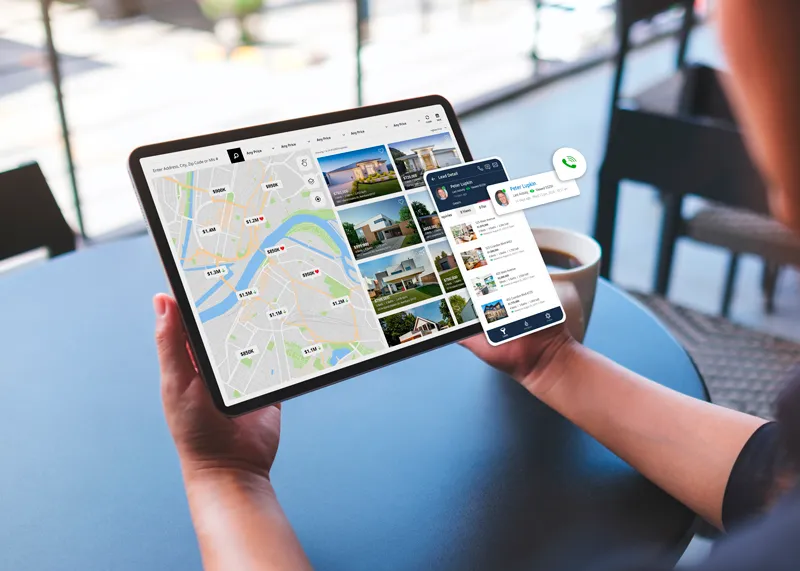Growth starts with asking yourself questions about your strategy to spot gaps, solve problems, and keep evolving.
Without this self-reflection, you risk staying stuck and falling behind in the competitive real estate market.
What questions will make a difference?
We’ve got the insights you need! In this guide to help realtors refine their lead generation and sales strategies, we’ve organized 10 essential questions into three key stages: attracting prospects, converting leads, and selling more homes.
Each stage focuses on optimizing your approach to engage potential clients, turn interest into action, and close deals effectively to stay ahead of the competition.
QUESTIONS TO ATTRACT
1. Who are my ideal buyers and sellers?
Not every buyer or seller is your ideal client. In today’s digital world, real estate success isn’t about reaching everyone; it’s about understanding your target market to create hyper-targeted campaigns that directly address the needs of your potential clients. With so much noise online, 56% of consumers feel most brand messages are irrelevant or unimportant. To stand out, focus on how you communicate with your target audience.
So… What are the most common real estate types of buyers and sellers, and how can you win them over?
We’ve had the privilege of working closely with real estate agents and brokers, gaining valuable insights into their daily challenges and the unique dynamics of the market.
Through these collaborations, our clients have shared their biggest pain points when it comes to connecting with different types of buyers and sellers. With this in mind, we’ve put together a comprehensive list to help you identify your ideal buyers and sellers, win them over, and make the process smoother and more effective.
Types of buyers
- Savers
Budget-focused and research-driven savers look for value and discounts. Tailor your campaigns to highlight savings, financial incentives, and cost comparisons that resonate with their focus on affordability.
- First-time buyers
These buyers are excited but often overwhelmed by the buying process. Your campaigns should simplify the buying journey by offering clear, easy-to-understand guidance, educational content, and reassurance about the decision-making process.
- Investors
Investors are looking for properties with strong returns. Your campaigns should emphasize the potential for rental income, long-term growth, and solid market data, showing how the property aligns with their investment goals.
- Luxury buyers
Luxury buyers are willing to pay for high-end properties. Use striking visuals, showcase exclusivity, and emphasize what makes the property unique to appeal to their desire for premium, sophisticated living.
Types of sellers
- Urgent sellers
Eager to sell quickly, urgent sellers seek fast, competitive offers. Your campaigns should emphasize urgency, quick results, and your ability to bring the right buyers promptly.
- Relocation sellers
Relocation sellers need to move fast due to job transfers or life changes. Highlight your efficiency in the selling process, flexibility with timelines, and strategies to ensure a smooth transition for these sellers.
- Investors
Investor sellers are looking for a fair return on their properties. Your campaigns should focus on the property’s value, market trends, and competitive pricing that will attract serious investors.
- Sentimental sellers
Sentimental sellers are attached to their homes and value the selling process. Your campaigns should show empathy and highlight how the property’s history will appeal to buyers.
Now that you understand the types of buyers and sellers and how to win them over, it’s time to assess whether your real estate website is doing the heavy lifting for your target audience.
Remember your website is the first touchpoint for potential clients and if it’s not optimized for lead generation, it’s a missed opportunity.
2. Is my real estate website a lead magnet or just a pretty page?
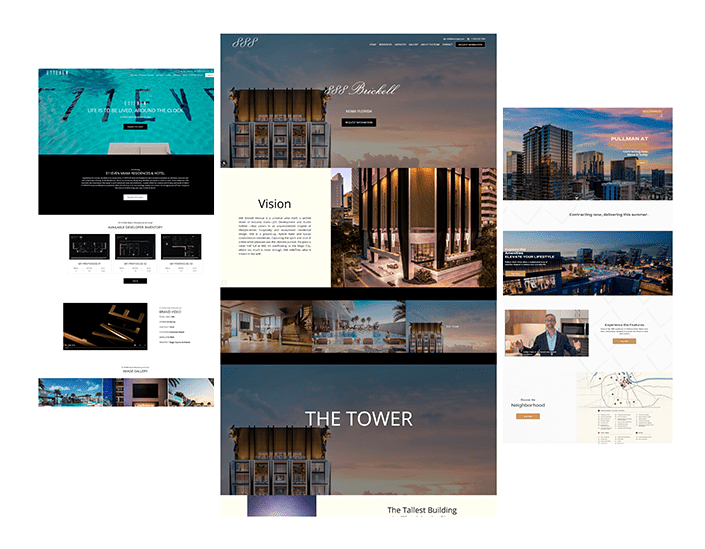 In 2025, looks don’t close deals, performance does. A truly effective website isn’t just visually appealing — it’s designed with purpose. It functions as a lead magnet, driving engagement and delivering tailored experiences that convert visitors into clients.
In 2025, looks don’t close deals, performance does. A truly effective website isn’t just visually appealing — it’s designed with purpose. It functions as a lead magnet, driving engagement and delivering tailored experiences that convert visitors into clients.
A lead magnet website engages visitors by capturing contact details, preferences, and intent. It offers a smooth, fast experience with mobile optimization and IDX integration for maximum conversions.
But what is IDX?
IDX (Internet Data Exchange) integration in the real estate industry is essential for effectively showcasing properties in your farming areas and enhancing lead capture response, helping you attract more qualified prospects.
It allows you to display listings directly from the MLS (Multiple Listing Service) and easily request contact information from your visitors. An MLS is where real estate listings are created and updated, while IDX is the tool that displays those listings on a real estate website for the public to view.
Here are some IDX features that make it happen:
- Lead capture widgets: Encourage visitors to sign up for free home evaluations, property alerts, and other offers while gathering contact info, preferences, and more.
- Property search forms: Require visitors to enter their contact information (name, email, phone number) to access full property details, saved searches, or listings.
- Saved search alerts: Visitors can sign up to receive alerts for new listings that match their criteria. In exchange, they provide their contact info, allowing you to follow up and engage.
- Contact forms on property pages: Add contact forms directly on property pages, encouraging visitors to inquire about specific homes and helping you collect valuable lead information.
- Interactive maps: Prompt users to register (or log in) to access detailed features, capturing their contact details during the process.
Learn more about our IDX real estate website integration features that turn real estate websites into powerful tools for generating leads for your business. A website without traffic is like a billboard in the middle of a desert — it might look great, but no one’s there to see it.
3. Is my real estate website getting noticed in the local organic “SEO” searches?
If you’re only focusing on traditional SEO, you’re missing the mark. Real estate is all about location, by optimizing your website for specific areas you can attract more clients, increase your visibility, and connect with local buyers and sellers more effectively.
That’s why effective lead generation strategies in real estate must focus on local SEO. Using local SEO tools, like Google My Business Profile, can make your business 2.7x more likely to be seen as reputable. 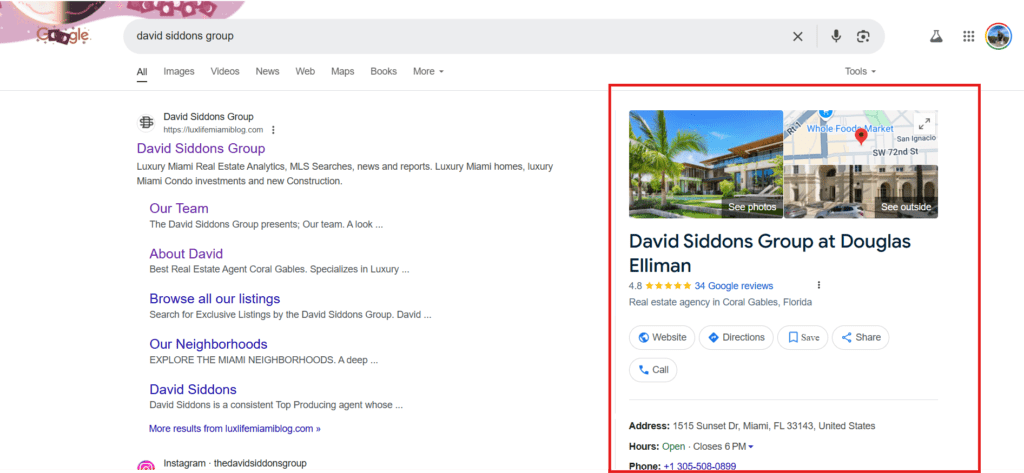 Here’s how you can start boosting your local presence:
Here’s how you can start boosting your local presence:
- Use hyperlocal keywords:
Target searches like “affordable condos near [location]” or “best neighborhoods for families in [location].” These terms help you rank higher for local searches and attract nearby clients.
- Optimize your Google Business Profile (GBP):
GBP allows you to manage your online presence on Google Search and Maps. Keep your profile updated with photos, reviews, and accurate business details to stand out and build trust with potential clients.
- Take advantage of Google’s Local Pack:
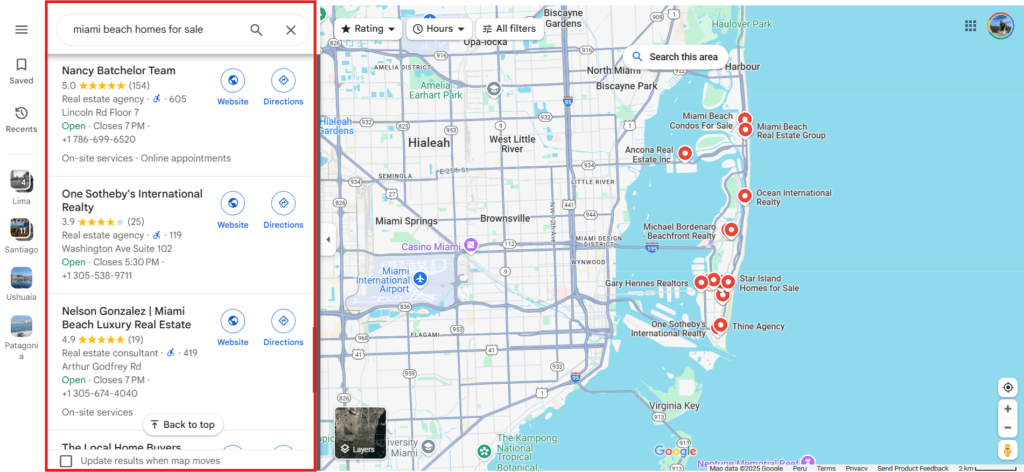 This is the map section at the top of the search results. Appearing here greatly increases your chances of being found by leads already interested in your area. Ensure your business details are complete, update information, upload high-quality photos, and respond to reviews to improve ranking.
This is the map section at the top of the search results. Appearing here greatly increases your chances of being found by leads already interested in your area. Ensure your business details are complete, update information, upload high-quality photos, and respond to reviews to improve ranking.
Getting noticed in local SEO is just the first step — but to truly stand out, you need a content strategy that captures attention, builds trust, and keeps your audience engaged. That’s why you should ask yourself…
4. What’s my content strategy – and is it bold enough to make an impact?
A bold content strategy does more than just fill space, it grabs attention, solves problems, and keeps your audience engaged. By creating content that informs and resonates, you attract leads and build lasting trust with your audience. Is yours making an impact? Here’s how you can start planning a content strategy that drives results:
- Set clear goals:
Define what you want to achieve, whether it’s lead generation, brand awareness, higher conversions, or re-engagement. Focus on measurable outcomes to guide your strategy.
- Know your audience:
Identify your ideal buyers or sellers and understand their needs. Tailor your content to address their concerns. Use the insights from the first question to pinpoint your ideal clients and develop strategies to win them over.
- Review existing content:
Evaluate your current content to identify what’s performing well and where there are gaps. This helps you refine your strategy and focus on areas that will drive results.
- Choose content types:
Select a mix of content formats to engage your audience:
- Educational content: Guides, market updates, and FAQs answer specific questions. While helpful, they can feel more informational unless mixed with other engaging content.
- Promotional content: Showcase your achievements, recent sales, and awards to build trust, but focus on demonstrating your expertise, not just promoting your business.
- Audience-focused content: Write lifestyle blogs, share neighborhood insights, and offer tips for first-time buyers to engage your audience and build long-term relationships.
- Create a content calendar:
Plan your content, mixing educational, promotional, and audience-focused pieces. Ensure consistency and relevancy by aligning your content with key events or seasons.
- Optimize for SEO:
Incorporate relevant keywords and focus on local SEO to ensure your content is easily found online. This improves visibility and attracts the right audience.
- Promote your content:
Distribute your content through social media, email newsletters, and paid ads to maximize reach and engagement. This ensures your content is seen by a wider audience.
- Measure results:
Use tools like Google Analytics to track how your content is performing. Monitor key metrics like traffic, leads, and engagement. Don’t forget to track your Return on Investment (ROI) to ensure your efforts are delivering real value.
- Refine your strategy:
Based on your metrics, tweak your strategy by testing new content ideas and formats. Adapt to your audience’s evolving needs to keep your content fresh and engaging. Attracting visitors to your real estate website is only half the battle — now it’s time to turn that interest into action.
Converting those visitors into qualified leads requires intentional strategies that guide them from curiosity to commitment. Let’s dive into how to make that leap seamless and impactful.
QUESTIONS TO CONVERT
5. Is my real estate website designed to generate leads?
 Your website’s ability to convert traffic into leads is essential for driving business growth. Attracting visitors is only half of the marketing battle; turning them into clients is the real challenge.
Your website’s ability to convert traffic into leads is essential for driving business growth. Attracting visitors is only half of the marketing battle; turning them into clients is the real challenge.
Take MiamiRealEstate.com, for example. Despite having over 15K visitors monthly, they weren’t generating any leads. How did they fix this problem? Click here to learn more Turning their website into a powerful lead-generation tool with a strong conversion strategy. To determine if your site is a lead-closing machine, evaluate its ability to convert visitors into prospects. Here are key factors to consider:
- Clear Call-to-Actions (CTAs): Does your site have visible and compelling CTAs that guide visitors to take the next step, whether scheduling a consultation or filling out a form?
- Lead capture forms: Are your forms easy for visitors to find and complete? They should be simple, asking for only essential information to avoid overwhelming potential leads.
- Engaging content: Does your website offer valuable content that speaks to your audience’s pain points and needs? Content such as guides, FAQs, and market insights can build trust and encourage visitors to take action.
- Trust signals: Do you display testimonials, success stories, or certifications to demonstrate your credibility? These help establish trust and reassure visitors that they’re in good hands.
- Responsive design: Is your site mobile-friendly? Many leads come from mobile devices, so a responsive design is essential for smooth navigation and conversion.
- Fast load time: Does your website load quickly? Slow load times can lead to frustrated visitors who leave before converting.
Stop Losing Deals – Get a Website That Works for You
Your website should be your strongest asset, not your weakest link. Let’s build a high-performing site that turns visitors into clients.
Get a powerful website today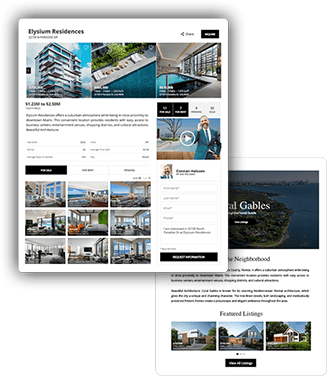
6. How am I nurturing leads at scale?
Once you’ve attracted a high volume of leads, the next step is to develop strong lead-nurturing strategies to follow up on them effectively. Build authentic connections, understand their challenges, and offer valuable information that positions you as a trusted resource. It takes effort, strategy, and a personalized approach, but it’s well worth it. Here are some online marketing tactics for nurturing leads at scale:
- CRM systems:
CRM systems segment and track leads, making it easier to personalize communication. This allows you to send tailored content and follow-ups that address each lead’s unique needs. Plus, it ensures you’re delivering the most relevant content at the right time.
- Automated email campaigns:
Develop targeted email sequences that guide leads through their journey, offering helpful resources, tips, or insights based on their position in the funnel. This helps maintain your brand’s visibility while delivering value.
- Personalized follow-ups:
Even at scale, personalization matters. Automated but personalized follow-up emails or messages show your leads that you value their interest and are paying attention to their unique needs.
- Social media engagement:
Use social media to foster ongoing conversations. Share helpful posts, respond to questions, and create opportunities for leads to engage with your brand. This keeps your business top-of-mind.
- Educational webinars or workshops:
Host informative sessions on topics your leads care about, such as home-buying processes or market trends. These events help establish your authority while offering real value.
7. Are my real estate listings visual blockbusters?
In real estate, high-quality visuals are essential to grab buyers’ attention. If your listings aren’t engaging, potential buyers may quickly move on to more captivating properties elsewhere. Along with great images, take your strategy to the next level with these cutting-edge technologies:
- Video walkthroughs: Guide buyers through the home, highlighting key features and fostering a deeper connection with the space.
- 3D Tours: Give buyers a deeper understanding of a property’s layout and flow, helping them feel like they’re already inside.
- Drone shots: Aerial views that showcase the home’s surroundings and offer a unique perspective buyers can’t get from regular photos.
- Virtual staging: Digitally furnished empty homes to help buyers visualize the space, enhancing its appeal without the cost or logistics of physical staging.
- Virtual reality (VR): Provide an immersive experience, allowing buyers to “walk through” homes from anywhere in the world.
Converting leads is a critical step, but the ultimate goal is turning those conversions into closed deals.
To sell more homes, you need to focus on strategies that not only build trust but also streamline the decision-making process for your clients. Let’s explore how to transform potential into profit and help more clients find their perfect home.
QUESTIONS TO SELL MORE HOMES
8. Is my sales pipeline working for me?
A disorganized pipeline can cost both time and potential deals. In contrast, engaging with leads based on a specific stage in the sales process increases your chances of closing deals. This approach can result in conversion rates up to 73% higher, as marketers who use this strategy have experienced.
So, how can you keep your pipeline efficient and results-driven?
Leverage CRM systems and automation tools that optimize every stage of your sales process.
- CRM (Customer Relationship Management):
A CRM system centralizes your contacts and sales activities, keeping you organized and on track. With a CRM, you can:
- Track where each lead is in the sales process.
- Set reminders for timely follow-ups.
- Prioritize deals that need attention.
- Automation
Automation takes care of repetitive tasks such as sending follow-up emails, scheduling meetings, and setting reminders.
- No leads are overlooked.
- You save time on manual tasks.
- You can focus on closing deals instead of managing paperwork.
9. Am I the go-to expert on social media?
 Social media is more than just showing up, it’s about showing off your expertise. Regularly share your knowledge, engage with your audience, and position yourself as the real estate authority.
Social media is more than just showing up, it’s about showing off your expertise. Regularly share your knowledge, engage with your audience, and position yourself as the real estate authority.
As you build trust, you’ll attract more buyers and sellers eager to work with you. Here are some strategies and tools you can use on social media:
- Educational content:
Share market updates, home-buying tips, and real estate trends to position yourself as an expert. Host Q&A sessions or go live to answer questions about buying or selling, connecting with potential clients in real time.
- Engagement strategy:
Posting is not enough, you need to interact with your followers. Respond to comments and messages, and engage with others in the real estate community. Ask questions to spark conversations and offer helpful answers. This builds trust and shows you’re approachable and knowledgeable.
- Consistency and branding:
Keep a consistent tone and style that reflects your brand. Regular posts help maintain visibility and keep you on top of mind with clients, even when you’re not selling something.
- Hashtags and SEO:
Use relevant and local hashtags to increase your visibility and connect with buyers and sellers in your area. Optimize your posts for search engines by sharing blog links, property listings, or market insights to make it easier for clients to find you.
- Networking and collaboration:
Partner with local businesses, agents, or influencers to extend your reach. Collaborating on live sessions, events, or promotions can introduce you to new audiences. Joining real estate groups and communities also helps expand your network.
- Analytics:
Track engagement metrics to see which content performs best. Use the insights to adjust your strategy and improve engagement across posts, ads, and campaigns.
10. Am I measuring what matters?
If you’re not tracking your performance, you’re guessing. Using data to guide your decisions lets you improve weak areas and amplify the strategies that deliver results. How can you measure your online success? Here are key metrics you should be checking:
- Website:
Using tools like Google Analytics, you can see where your visitors are coming from, what pages are converting, and how they interact with your site. Plus a dedicated real estate CRM that tracks your property listings’ user activity and is a great tool for following up with prospects.
- Social media
Use the analytics tools provided by social media platforms like Instagram Insights, Meta Business Suite, or LinkedIn Analytics to track engagement metrics. These include likes, shares, comments, and click-through rates, which help you understand what content resonates with your audience and adjust your strategy accordingly.
CONCLUSION
To dominate the real estate game in 2025, refine your lead generation strategy in three key areas: attracting prospects, converting leads, and closing deals.
By improving your approach, you’ll make the most of the right tools, like an advanced IDX website, personalized lead nurturing, and a CRM-driven sales pipeline. These tools don’t just keep you competitive—they help you build trust and work more efficiently. If you haven’t started using them yet, now is the time. The future is here, and it’s time to get ahead.
Looking To Grow Your Online Presence?
Your website should be a powerful tool for growth. Let’s enhance your website to attract and convert visitors into loyal customers.
Book a demo today
